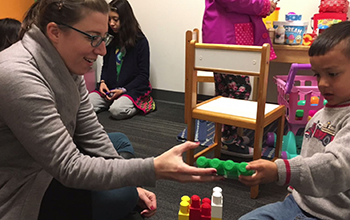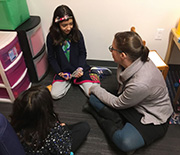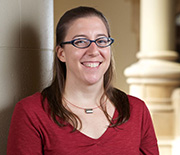News Release 18-027
Developmental psychologist receives 2018 Alan T. Waterman Award
Kristina R. Olson takes award for breakthrough research on early childhood development
April 12, 2018
This material is available primarily for archival purposes. Telephone numbers or other contact information may be out of date; please see current contact information at media contacts.
The National Science Foundation (NSF) has bestowed the 2018 Alan T. Waterman Award, the nation's highest honor for early career scientists and engineers, on University of Washington (UW) social and developmental psychologist Kristina R. Olson.
The Waterman Award Committee, an external panel of distinguished scientists and engineers chaired by Gary May, Chancellor of the University of California, Davis, and which includes the leadership of the National Academies of Science and Engineering, made the selection based on the merit and impact of Olson's research. They unanimously recommended her as the Waterman awardee from a large group of highly qualified early career nominees representing all disciplines.
Olson is recognized for her innovative contributions to understanding children's attitudes toward and identification with social groups, early prosocial behavior, the development of notions of fairness, morality, inequality and the emergence of social biases.
"The history of scientific discovery reveals many examples of the important role the social sciences can play in enhancing our health, security and national prosperity," May said. "Kristina Olson's research on bias has been identified as enlarging our perspective on how people, cultures and nations relate to one another. She was a unanimous choice for this prestigious recognition."
Olson is the first social scientist to receive the Alan T. Waterman Award since 2005. She is also the first woman to receive the award since 2004. NSF Director France Córdova will introduce her at an event hosted by NSF and the National Science Board in May.
Olson says her work is important for all major societal issues -- from trade disputes to health disparities to international relations. "I believe it is impossible to solve any large-scale social issues without documenting, understanding and ultimately bridging differences in people's racial, cultural, gender and other identities," she said.
For Olson, understanding the attitudes of adults starts with understanding the attitudes of children. As a young child attending elementary school, Olson noticed some of her peers were treated better or worse based on socioeconomic status, race, religion, ability and national background. Her early experiences fueled her interest in how people "divide the world into social groups of us and them."
She was particularly interested in using cognitive, social and developmental psychology to study the origins and development of such biases in young people. That focus drove her to many notable discoveries. Among them, she found that children believe people have what they deserve -- they see groups with fewer resources as deserving fewer resources. Moreover, Olson's research also found the mere existence of inequalities can cause children to develop prejudices and biased behaviors.
In 2013, she organized and began leading a 20-year longitudinal research study of early childhood gender development. The study currently follows more than 1,000 children aged 3-12 from 45 U.S. states. The project will enable researchers to track social and behavioral influences on health, and evaluate the importance of childhood identity and the support children receive to lifelong health and well-being.
"While we are still in the early stages, I believe this work has the possibility of changing society's understanding of gender and identity," Olson said.
Although many of her findings have been made relatively recently, pediatricians are already using them to educate families and the public about social and health issues related to gender diversity.
Olson received an NSF Graduate Research Fellowship as an undergraduate at Washington University in St. Louis, from which she graduated in 2003. She earned a doctorate in social psychology from Harvard University in 2008 and currently serves as an associate professor and associate chair for UW's Department of Psychology.
Olson has received the Association for Psychological Science's Janet Taylor Spence Award, fellow status from the Association for Psychological Science, the Davida Teller Distinguished Faculty Mentor Award, the SAGE Young Scholars Award and others.
-NSF-
-
Award winner Kristina Olson conducts developmental psychology studies with young children.
Credit and Larger Version -
University of Washington developmental psychologist Kristina Olson uncovers how attitudes develop.
Credit and Larger Version
Media Contacts
Bobbie Mixon, NSF, (703) 292-8485, email: bmixon@nsf.gov
Related Websites
Alan T. Waterman Award Fact Sheet: https://www.nsf.gov/news/news_summ.jsp?cntn_id=102999
The U.S. National Science Foundation propels the nation forward by advancing fundamental research in all fields of science and engineering. NSF supports research and people by providing facilities, instruments and funding to support their ingenuity and sustain the U.S. as a global leader in research and innovation. With a fiscal year 2023 budget of $9.5 billion, NSF funds reach all 50 states through grants to nearly 2,000 colleges, universities and institutions. Each year, NSF receives more than 40,000 competitive proposals and makes about 11,000 new awards. Those awards include support for cooperative research with industry, Arctic and Antarctic research and operations, and U.S. participation in international scientific efforts.
Connect with us online
NSF website: nsf.gov
NSF News: nsf.gov/news
For News Media: nsf.gov/news/newsroom
Statistics: nsf.gov/statistics/
Awards database: nsf.gov/awardsearch/
Follow us on social
Twitter: twitter.com/NSF
Facebook: facebook.com/US.NSF
Instagram: instagram.com/nsfgov



